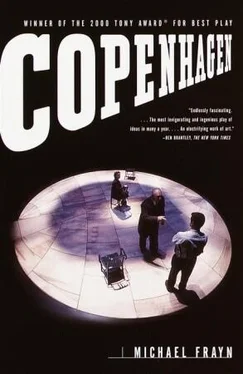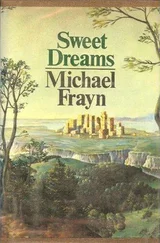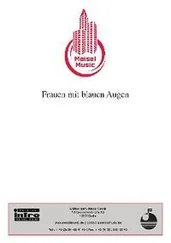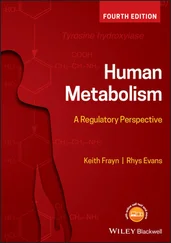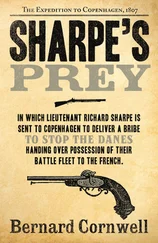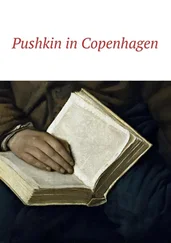Heisenberg Why?
Bohr Why are you confident that it’s going to be so reassuringly difficult to build a bomb with 235? Is it because you’ve done the calculation?
Heisenberg The calculation?
Bohr Of the diffusion in 235. No. It’s because you haven’t calculated it. You haven’t considered calculating it. You hadn’t consciously realised there was a calculation to be made.
Heisenberg And of course now I have realised. In fact it wouldn’t be all that difficult. Let’s see.… The scattering cross-section’s about 6 × 10 −24, so the mean free path would be … Hold on …
Bohr And suddenly a very different and very terrible new world begins to take shape …
Margrethe That was the last and greatest demand that Heisenberg made on his friendship with you. To be understood when he couldn’t understand himself. And that was the last and greatest act of friendship for Heisenberg that you performed in return. To leave him misunderstood.
Heisenberg Yes. Perhaps I should thank you.
Bohr Perhaps you should.
Margrethe Anyway, it was the end of the story.
Bohr Though perhaps there was also something I should thank you for. That summer night in 1943, when I escaped across the Sound in the fishing-boat, and the freighters arrived from Germany …
Margrethe What’s that to do with Heisenberg?
Bohr When the ships arrived on the Wednesday there were eight thousand Jews in Denmark to be arrested and crammed into their holds. On the Friday evening, at the start of the Sabbath, when the SS began their round-up, there was scarcely a Jew to be found.
Margrethe They’d all been hidden in churches and hospitals, in people’s homes and country cottages.
Bohr But how was that possible? — Because we’d been tipped off by someone in the German Embassy.
Heisenberg Georg Duckwitz, their shipping specialist.
Bohr Your man?
Heisenberg One of them.
Bohr He was a remarkable informant. He told us the day before the freighters arrived — the very day that Hitler issued the order. He gave us the exact time that the SS would move.
Margrethe It was the Resistance who got them out of their hiding-places and smuggled them across the Sound.
Bohr For a handful of us in one fishing smack to get past the German patrol-boats was remarkable enough. For a whole armada to get past, with the best part of eight thousand people on board, was like the Red Sea parting.
Margrethe I thought there were no German patrol-boats that night?
Bohr No — the whole squadron had suddenly been reported unseaworthy.
Heisenberg How they got away with it I can’t imagine.
Bohr Duckwitz again?
Heisenberg He also went to Stockholm and asked the Swedish Government to accept everyone.
Bohr So perhaps I should thank you.
Heisenberg For what?
Bohr My life. All our lives.
Heisenberg Nothing to do with me by that time. I regret to say.
Bohr But after I’d gone you came back to Copenhagen.
Heisenberg To make sure that our people didn’t take over the Institute in your absence.
Bohr I’ve never thanked you for that, either.
Heisenberg You know they offered me your cyclotron?
Bohr You could have separated a little 235 with it.
Heisenberg Meanwhile you were going on from Sweden to Los Alamos.
Bohr To play my small but helpful part in the deaths of a hundred thousand people.
Margrethe Niels, you did nothing wrong!
Bohr Didn’t I?
Heisenberg Of course not. You were a good man, from first to last, and no one could ever say otherwise. Whereas I …
Bohr Whereas you, my dear Heisenberg, never managed to contribute to the death of one single solitary person in all your life.
Margrethe Well, yes.
Heisenberg Did I?
Margrethe One. Or so you told us. The poor fellow you guarded overnight, when you were a boy in Munich, while he was waiting to be shot in the morning.
Bohr All right then, one. One single soul on his conscience, to set against all the others.
Margrethe But that one single soul was emperor of the universe, no less than each of us. Until the morning came.
Heisenberg No, when the morning came I persuaded them to let him go.
Bohr Heisenberg, I have to say — if people are to be measured strictly in terms of observable quantities …
Heisenberg Then we should need a strange new quantum ethics. There’d be a place in heaven for me. And another one for the SS man I met on my way home from Haigerloch. That was the end of my war. The Allied troops were closing in; there was nothing more we could do. Elisabeth and the children had taken refuge in a village in Bavaria, so I went to see them before I was captured. I had to go by bicycle — there were no trains or road transport by that time — and I had to travel by night and sleep under a hedge by day, because all through the daylight hours the skies were full of Allied planes, scouring the roads for anything that moved. A man on a bicycle would have been the biggest target left in Germany. Three days and three nights I travelled. Out of Württemberg, down through the Swabian Jura and the first foothills of the Alps. Across my ruined homeland. Was this what I’d chosen for it? This endless rubble? This perpetual smoke in the sky? These hungry faces? Was this my doing? And all the desperate people on the roads. The most desperate of all were the SS. Bands of fanatics with nothing left to lose, roaming around shooting deserters out of hand, hanging them from roadside trees. The second night, and suddenly there it is — the terrible familiar black tunic emerging from the twilight in front of me. On his lips as I stop — the one terrible familiar word. ‘Deserter,’ he says. He sounds as exhausted as I am. I give him the travel order I’ve written for myself. But there’s hardly enough light in the sky to read by, and he’s too weary to bother. He begins to open his holster instead. He’s going to shoot me because it’s simply less labour. And suddenly I’m thinking very quickly and clearly — it’s like skiing, or that night on Heligoland, or the one in Faelled Park. What comes into my mind this time is the pack of American cigarettes I’ve got in my pocket. And already it’s in my hand — I’m holding it out to him. The most desperate solution to a problem yet. I wait while he stands there looking at it, trying to make it out, trying to think, his left hand holding my useless piece of paper, his right on the fastening of the holster. There are two simple words in large print on the pack: Lucky Strike. He closes the holster, and takes the cigarettes instead.… It had worked, it had worked! Like all the other solutions to all the other problems. For twenty cigarettes he let me live. And on I went. Three days and three nights. Past the weeping children, the lost and hungry children, drafted to fight, then abandoned by their commanders. Past the starving slave-labourers walking home to France, to Poland, to Estonia. Through Gammertingen and Biberach and Memmingen. Mindelheim, Kaufbeuren, and Schöngau. Across my beloved homeland. My ruined and dishonoured and beloved homeland.
Читать дальше
